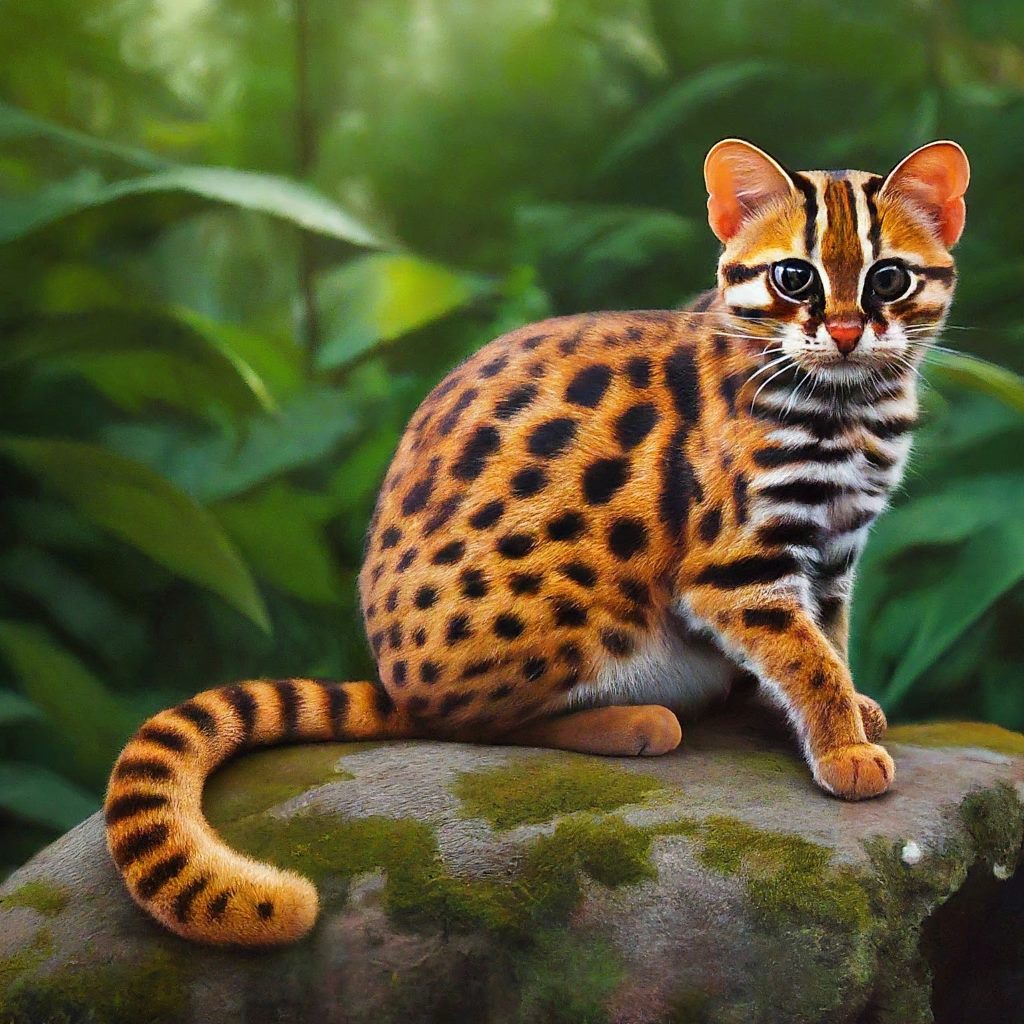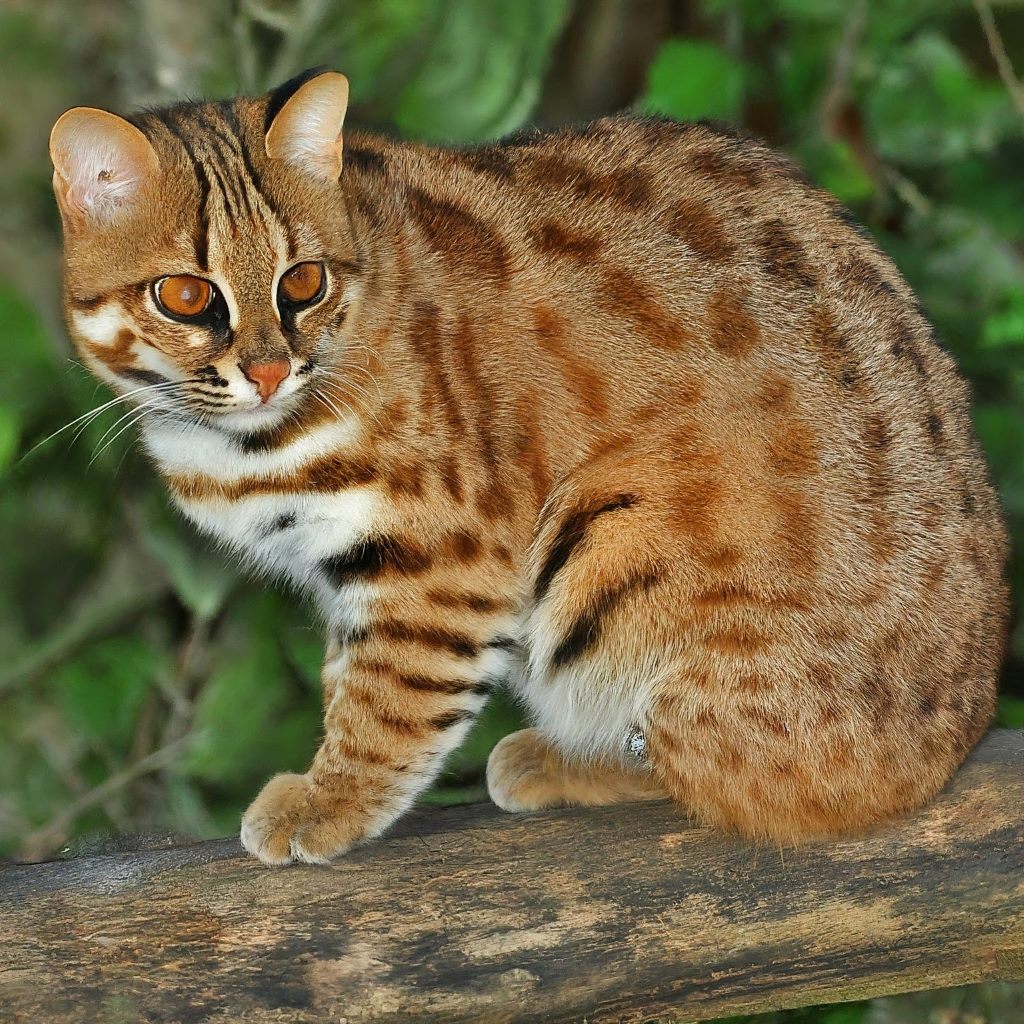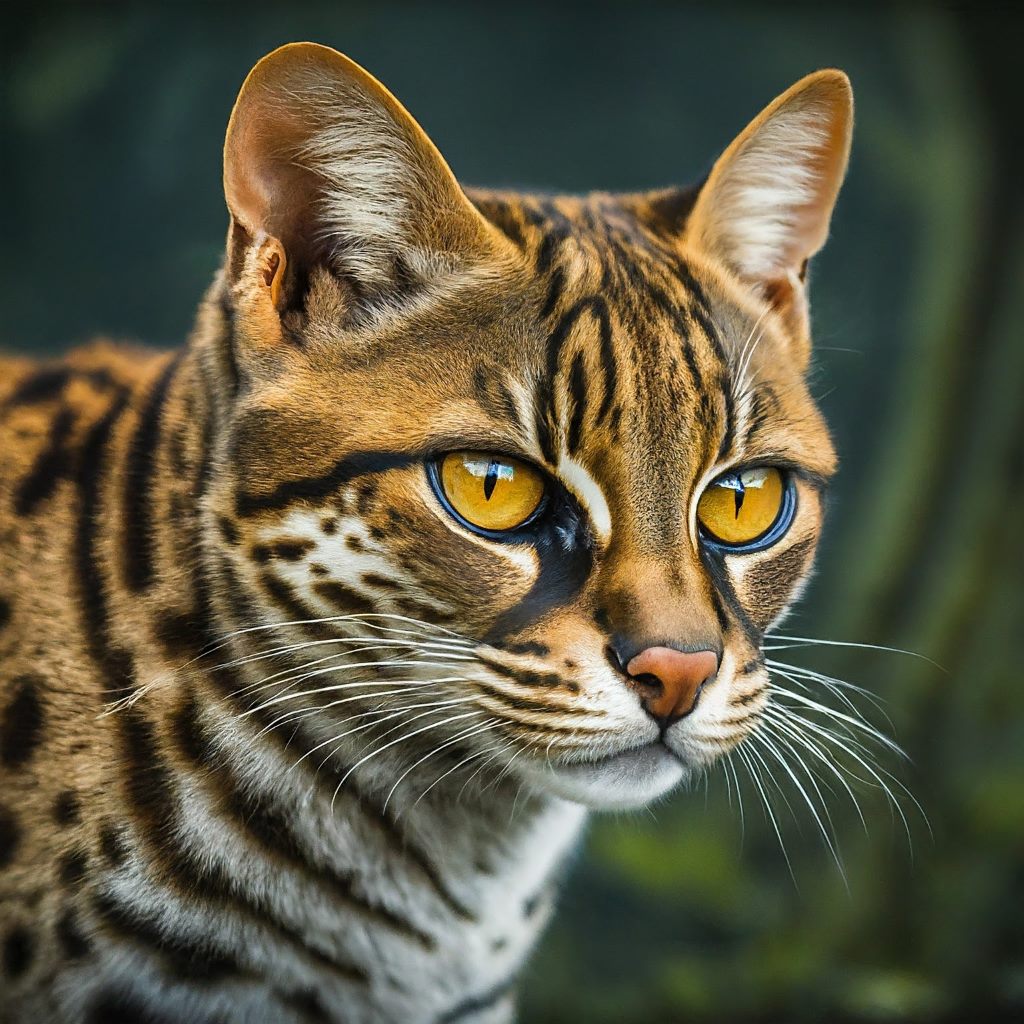Rusty-spotted cats are the world’s smallest cat species. They are native to South Asia, specifically in India and Sri Lanka and partially Nepal. As the world’s smallest wild cat species, they are highly elusive and well adapted to their environment. As a wildlife feline expert, it is important to understand the behavior, ecology, and conservation status of rusty-spotted cats to ensure their survival in the wild. Through research and conservation efforts, we can work towards protecting and preserving these unique and endangered species for future generations to enjoy.
Contents
Here Are 6 Facts About Rusty-spotted Cats:
1) Rusty-spotted cat Price:
Rusty-spotted cats are not commonly kept as pets and are usually not available for sale in pet stores. It is also illegal to own a rusty-spotted cat as a pet in some countries due to their protected status. Therefore, it is difficult to determine the price of rusty-spotted cats.
2) Rusty-spotted cat Diet:
Rusty-spotted cats are carnivorous and their diet mainly consists of small mammals, birds, lizards, and insects. In captivity, they can be fed a diet of commercial cat food supplemented with live insects and occasional small pieces of meat.
Rusty-spotted cats are solitary hunters that prefer to hide in dense vegetation or trees during the day. Despite their small size, they are fierce predators and have been known to take down prey much larger than themselves.
3) Rusty-spotted cat Size:
Rusty-spotted cats are the smallest wild cat species, with adults weighing between 0.9 to 1.6 kg (2 to 3.5 lbs) and measuring 35 to 48 cm (14 to 19 inches) in length, not including their tails which are about the same length as their body.
4) Rusty-spotted cat Appearance:
Rusty-spotted cats are known for their distinctive rusty-colored fur with black spots and stripes. They have round ears and large eyes that are adapted for night vision.
The rusty-spotted cat has short reddish grey hair that covers the majority of its body, with rusty spots on the back and flanks. Four blackish lines go over the eyes, two of which continue down the neck. Six black streaks go across the cheekbones and forehead on each side of the head.
5) Rusty-spotted cat Habitat:
Rusty-spotted cats are found in a variety of habitats including forests, grasslands, and scrublands. They are most commonly found in dense vegetation near water sources.
6) Rusty-spotted cat Conservation status:
Rusty-spotted cats are listed as near threatened by the International Union for Conservation of Nature (IUCN). The main threats to their survival are habitat loss due to deforestation, fragmentation of their habitat, and poaching for their fur.
The rusty-spotted cat is said to be expressive, lively, and friendly, and it is simple to domesticate. The IUCN Red list categorises the rusty-spotted cat as endangered due to its high risk of extinction in the wild.
Conservation efforts are underway to protect rusty-spotted cats and their habitats. In Sri Lanka, the Small Cat Advocacy and Research (SCAR) organization is working to raise awareness of the importance of protecting rusty-spotted cats and their habitat. They are also working to collect data on the population and behavior of rusty-spotted cats to inform conservation efforts.

Rusty-Spotted Cats as Pets
Rusty-spotted cats are wild animals and are not suitable as pets. They are protected under national and international laws due to their endangered status, and it is illegal to keep them as pets in many countries.
Moreover, even if it were legal, it is not recommended to keep rusty-spotted cats as pets because they have specific dietary and environmental requirements that are difficult to meet in a home environment. Rusty-spotted cats are carnivorous and require a diet of live prey, which can be difficult and expensive to provide. They also require a large amount of space to roam and climb, and they need a specialized environment that mimics their natural habitat.
Additionally, keeping a wild animal as a pet can be dangerous for both the owner and the animal. Rusty-spotted cats are wild animals and have instincts that may lead them to become aggressive or unpredictable. They can also transmit diseases to humans and other animals.
Overall, it is not ethical, legal, or practical to keep rusty-spotted cats as pets. If you are interested in owning a cat, it is recommended to adopt a domesticated cat from a local animal shelter or rescue organization. Domesticated cats have been bred for centuries to live with humans and are better suited for life in a home environment.

Rusty-Spotted Cat Food and Diet
Rusty-spotted cats are carnivores, and their diet mainly consists of small mammals, birds, lizards, and insects. In the wild, they hunt primarily at night and have adapted to eat a variety of prey species depending on their availability.
If you are caring for a rusty-spotted cat in captivity, it is essential to provide a diet that meets their nutritional needs. A balanced diet should include a variety of protein sources, including whole prey items like rodents, chicks, and insects.
Commercially available cat foods can be used as a supplement to the diet, but they should not be the primary food source. Some high-quality commercial cat foods are specially formulated for small wild cats and can provide a balanced diet. However, they should be supplemented with whole prey items to meet the cat’s need for natural prey stimulation and to help prevent obesity.
It is essential to provide fresh water at all times, and the water dish should be cleaned regularly to prevent the growth of bacteria.
Overall, it is important to do thorough research and consult with a veterinarian or a nutritionist before feeding a rusty-spotted cat in captivity. A diet that is not nutritionally balanced can lead to health problems, including dental issues, digestive problems, and malnutrition.
Rusty Spotted Cat Age and Lifespan
The average lifespan of rusty-spotted cats in the wild is not well-known, but it is estimated to be around 4 to 6 years. In captivity, they can live up to 12 years or more with proper care.
The lifespan of a rusty-spotted cat depends on various factors such as genetics, diet, and habitat. In the wild, they face threats such as habitat loss, hunting, and disease, which can affect their lifespan. In captivity, they need to be provided with proper diet, medical care, and a suitable living environment to ensure their health and longevity.
Rusty Spotted Cat Size, Height and Weight
Rusty-spotted cats are the world’s smallest wild cat species, with adults typically weighing between 0.9 to 1.6 kg (2 to 3.5 lbs) and measuring 35 to 48 cm (14 to 19 inches) in length, not including their tails. Their tails are about the same length as their body, adding an extra 15 to 30 cm (6 to 12 inches) to their total length.
In terms of height, rusty-spotted cats are relatively short, with a shoulder height of about 20 to 25 cm (8 to 10 inches) at the shoulder.
Despite their small size, rusty-spotted cats are powerful and agile predators, capable of climbing trees and hunting prey larger than themselves. They are well adapted to their environment, with sharp claws and excellent night vision that helps them hunt in the dark.
Are Rusty Spotted Cats Dangerous?
Rusty-spotted cats are wild animals and have the potential to be dangerous, especially if they feel threatened or cornered. However, they are generally shy and elusive, and their small size means that they are not typically considered a significant threat to humans.
In the wild, rusty-spotted cats are known to avoid humans and other large animals, preferring to hide in dense vegetation or trees. They are more active at night and are generally not seen during the day, which further reduces the chances of human-cat interactions.
How Many Rusty Spotted Cats Are Left?
According to Wildlifesos There are about 10,000 rusty-spotted cats in the wild, but only 40 to 50 are known to live in captivity.
The population of rusty-spotted cats in the wild is not well known, but it is estimated to be decreasing rapidly. Rusty-spotted cats are considered endangered by the International Union for Conservation of Nature (IUCN) due to habitat loss, hunting, and other threats.
Rusty-spotted cats are found in India and Sri Lanka, where their populations are fragmented and declining. In India, they are found in several protected areas, including wildlife reserves and national parks. In Sri Lanka, they are found in forested areas and agricultural landscapes.
How To Identify A Rusty Spotted Cat?
Rusty-spotted cats can be identified by their small size and distinctive markings. Here are some key features to look for when identifying rusty-spotted cats:
- Size: Rusty-spotted cats are the smallest wild cat species, with adults typically weighing between 0.9 to 1.6 kg (2 to 3.5 lbs) and measuring 35 to 48 cm (14 to 19 inches) in length, not including their tails.
- Coat: Rusty-spotted cats have short, soft fur that is pale gray to reddish-brown in color. They have rusty-colored spots on their sides and a white underside. Their tails are ringed with black and tipped with black fur.
- Head: Rusty-spotted cats have a rounded head with large, pointed ears. They have distinctive white markings around their eyes and a short, broad nose.
- Behavior: Rusty-spotted cats are shy and elusive, and are most active at night. They are solitary hunters and prefer to hide in dense vegetation or trees during the day.
It is important to note that rusty-spotted cats are wild animals and should not be approached or disturbed. If you believe you have spotted a rusty-spotted cat, it is best to observe it from a safe distance and contact local wildlife authorities or conservation organizations for guidance.
Summary
Due to their small size and elusive behavior, rusty-spotted cats are challenging to study and monitor in the wild. More research is needed to understand their population status and threats, but current estimates suggest that there may be only a few thousand individuals remaining in the wild.
Overall, while rusty-spotted cats are small and cute, they are not suitable as pets due to their wild nature and protected status. If you are interested in owning a cat, it is recommended to adopt a domesticated cat from a local animal shelter or rescue organization.
